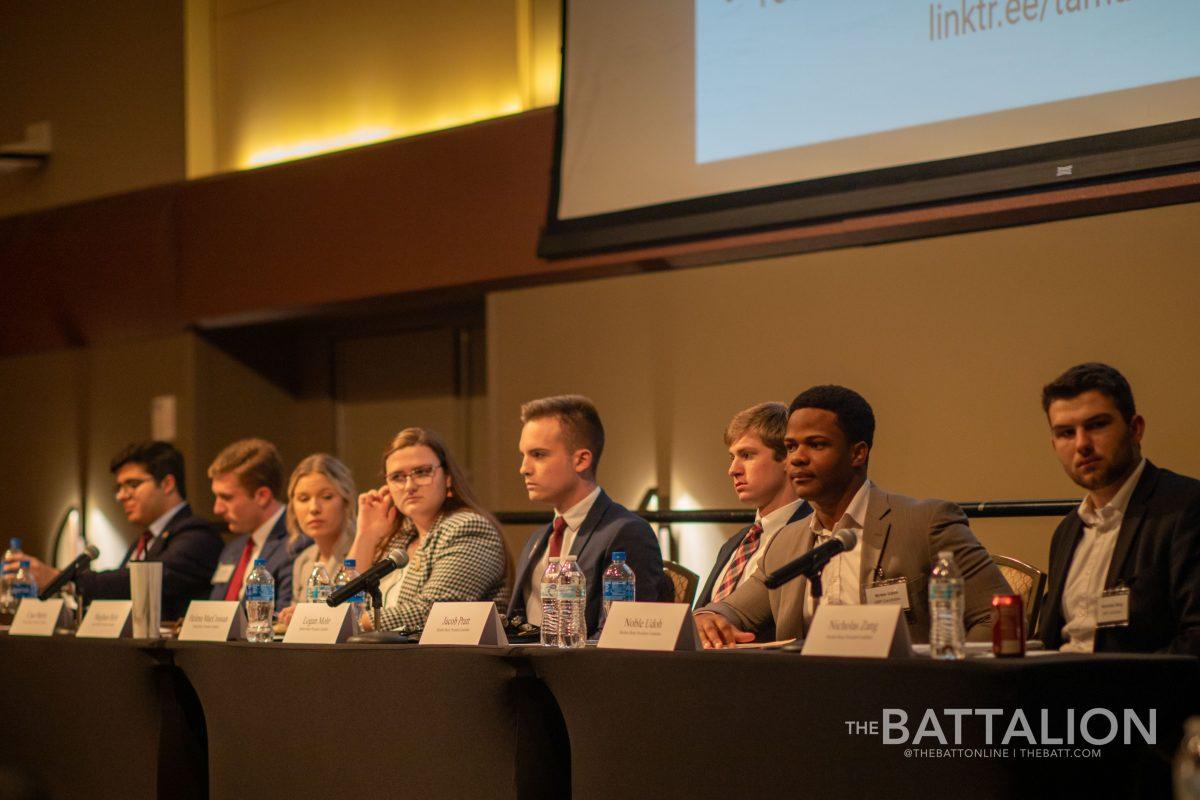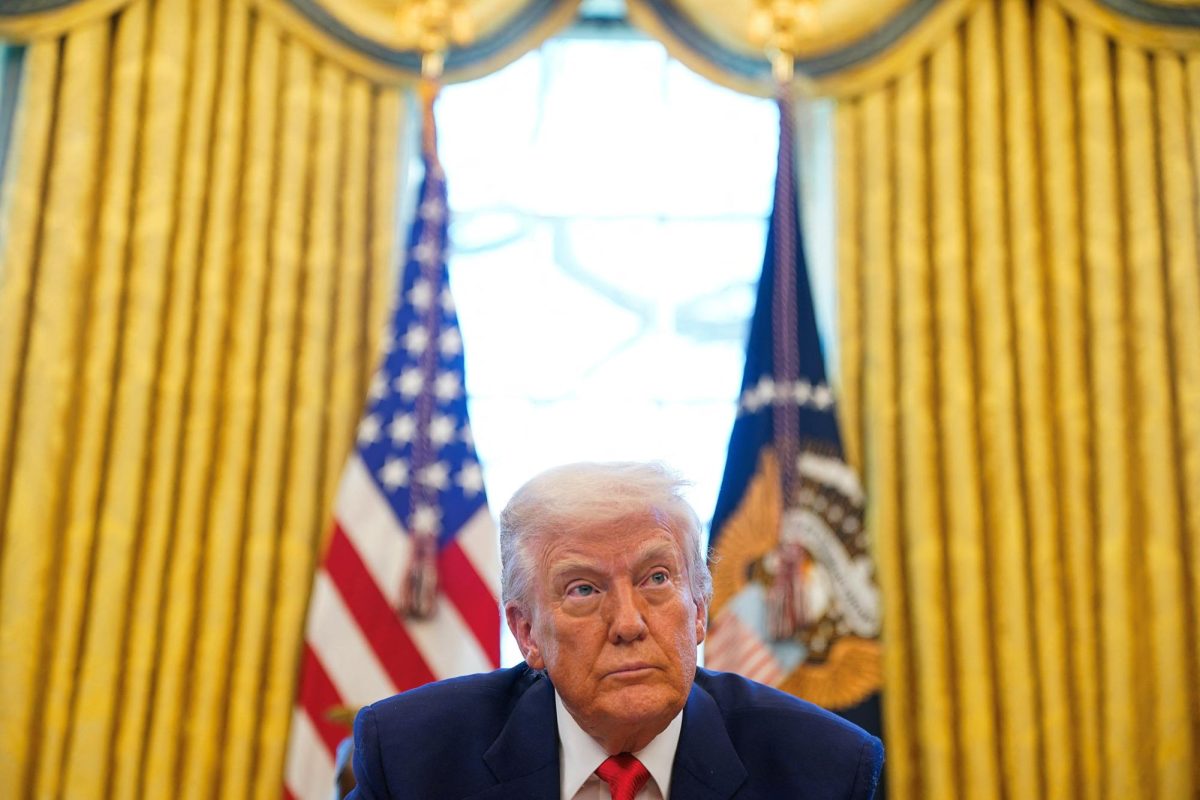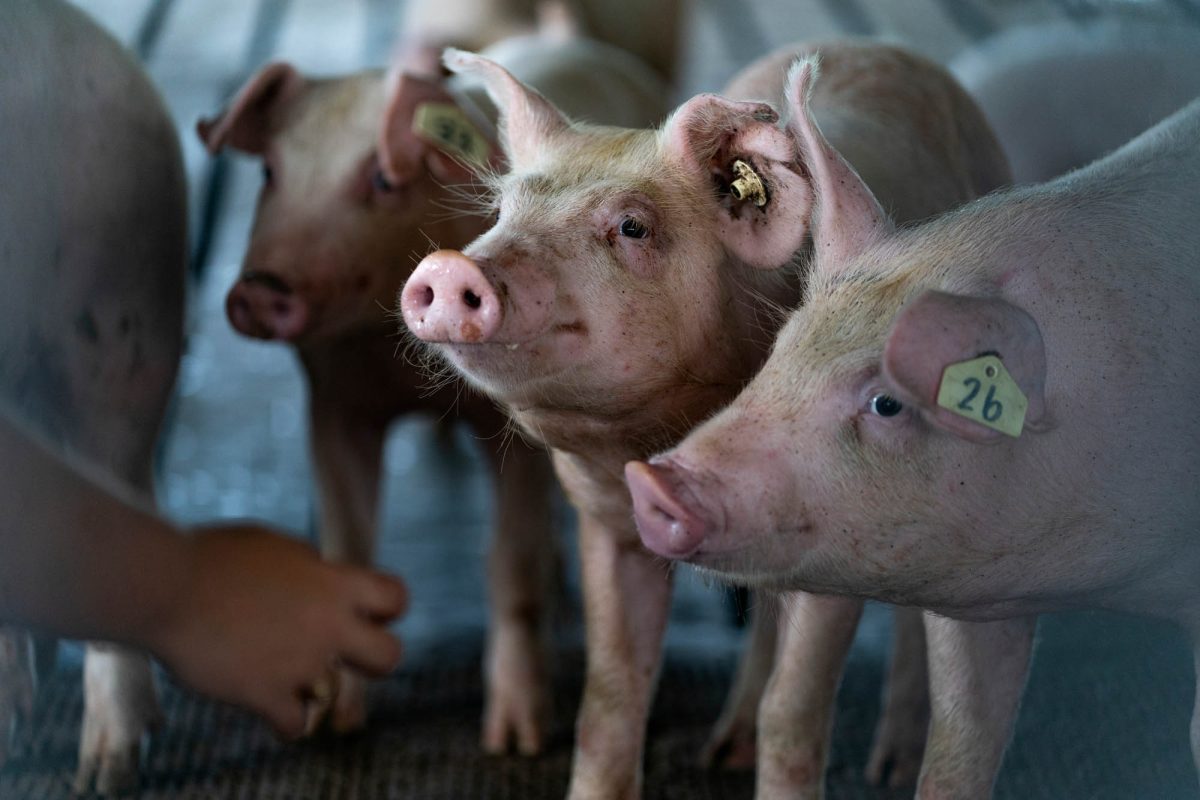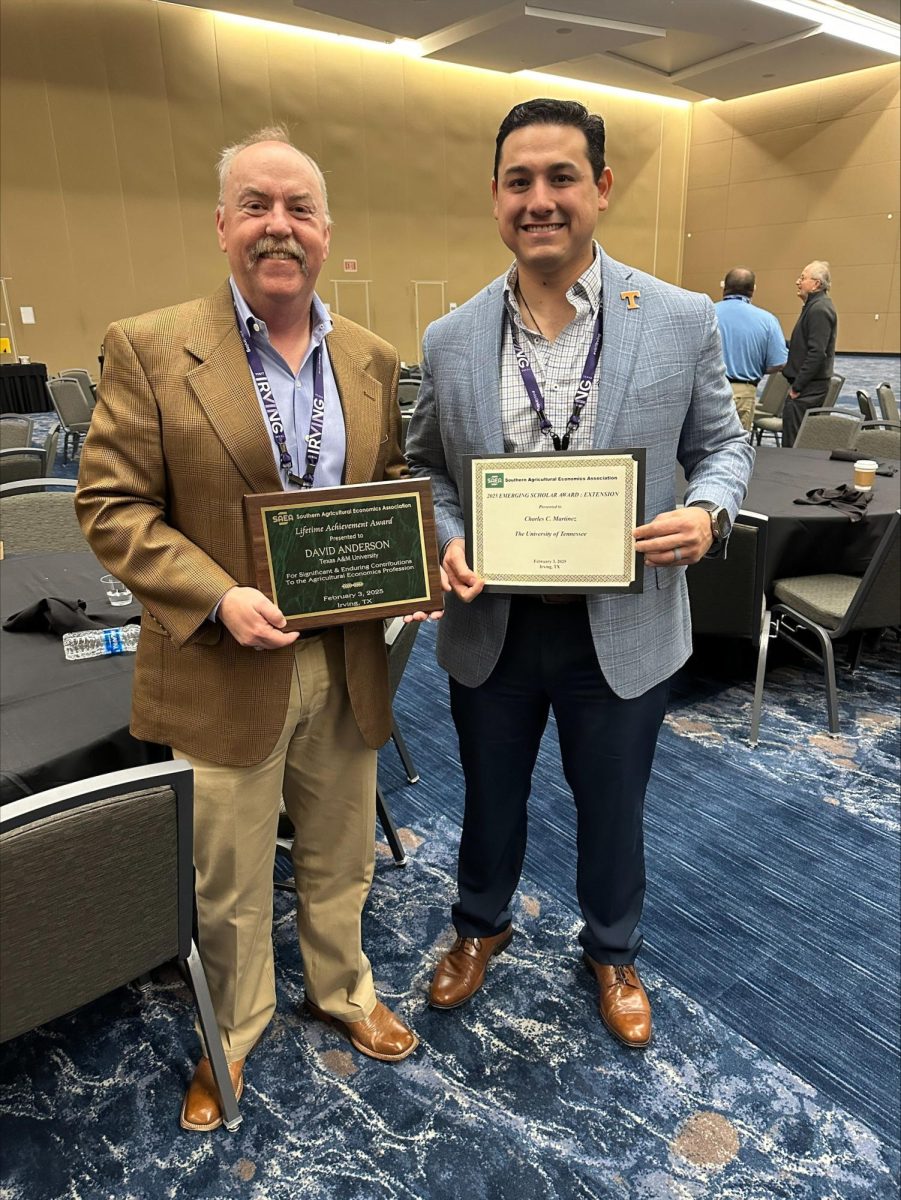On Saturday, Feb. 26, eight student body president candidates gathered in the Memorial Student Center to answer student-generated questions on the topics of diversity, inclusion, access and equity in a moderated town hall, hosted jointly by the Student Government Association Diversity Commission and the Matthew Gaines Society.
This year’s town hall was moderated by telecommunication graduate Karlina Sample, a defender on the Texas A&M soccer team and president of “Black Leaders who Undertake Excellence” or B.L.U.E.print and communication sophomore Chase Lane, wide receiver for the Texas A&M football team and vice president of B.L.U.E.print.
To start, each candidate was given two minutes for opening remarks. Sports management junior Nicholas Zang was the first to give remarks, and said he feels his exposure to diversity at A&M has helped him to better understand his peers.
“I feel the diversity of this university is lacking,” Zang said. “Diversity is not, to me, only about the color of your skin, but more importantly, about the culture and background that you come from, that has shaped you as a person. Without a mixture of cultures, we wouldn’t have the opportunity to truly understand each other as people and equip [ourselves] with the ability to get to know each other and understand what each person is going through.”
During these opening remarks, finance junior Case Harris said that even though A&M has diversity, the campus experiences of students with different backgrounds are still inconsistent.
“We have an incredible opportunity here at Texas A&M, we have 70,000 plus students of all different backgrounds, histories, religions, races, every type of diversity you can think of, we have it here,” Harris said. “[It is] an incredible opportunity for us to grow and learn together, but we do have issues as well,” Newton said. “A lot of students here are underrepresented and are facing challenges and boundaries that other students are not facing.”
For the remainder of the town hall, questions were divided into the topics of diversity, inclusion, access and equity. Two candidates per category were randomly selected to answer a directed question, followed by new questions that any candidate could respond to in two minutes or less.
As a part of the diversity section, candidates were asked how they would work with the Diversity Commission to help students, if elected as SBP. Mechanical engineering junior Victor Ferro said one way he would partner with the commission is through the creation of new traditions.
“The student body has become a lot more diverse, but our traditions haven’t changed,” Ferro said. “I love this university because of our traditions, but it’s a reality that a big part of the student population don’t feel represented with these traditions. Hopefully, as the student body president, I will open the door to new traditions that represent the new, evolving, student population, so they feel they have a place here to grow and develop, to be the leaders of tomorrow.”
In the equity portion, candidate Helena MacCrossan was asked how she would support first generation students on campus, given that in the fall of 2019, 23% of freshman students fell into this category. MacCrossan said her idea is to ensure students have guidance to resources from their first interactions on campus.
“[First generation students] might not know about the resources we offer on this campus to help them be successful in academics, in joining organizations, building their resumes, and ultimately getting jobs,” MacCrossan said. “We have some great examples of how we can get students to resources, in first-year experience classes like Hullabaloo U, and through their residence advisors. Making sure … their first-contact points are educated to connect them to those resources, that ultimately would be the biggest breakdown [of barriers] in connecting students to resources.”
In the general question section, candidates were asked how they had personally promoted equity in their time on campus. Agricultural economics junior Meghan Hein said that in her roles within SGA, she made specific changes to the organization’s rules to help all members feel welcome.
“For diversity, I served as the rules and regulations chair in the Student Senate, and I made two significant code changes to ensure that we are inclusive of everyone,” Hein said. “We changed the pronouns in official documents from she/her and him/his to they/them, because most of the pronouns were he/him centered. We also introduced an act that removed gender identity from the dress code so when people show up for Senate, they are able to represent their constituents dressed however they feel most comfortable.”
On the topic of inclusion, public health senior Noble Udoh was asked how he would balance encouraging diversity of thought on campus while avoiding instances of hate speech. Udoh said by ensuring all sides of conversations see others as people, and using the Aggie Core Value of Respect, conversations can be had authentically and respectfully.
“I think diversity of thought is necessary and important when it comes to the advancement of our institution,” Udoh said. “In order to have diversity of thought, while also making sure we don’t promote hate speech, we need to get people in the same room, like what we’re doing now. Sitting down and having conversations about what we can do about diversity, equity, inclusion and access so people can hash out their differences but do so respectfully. When you see someone as a human being, face to face, it’s easier to agree to disagree in a respectful, and not hateful, way.”
When the panel was asked about concrete steps they would take to make sure LGBTQ+ students feel welcomed and included at A&M, political science junior Logan Mohr said he would ensure queer students have a seat at the table, especially in response to the recent Draggieland controversy.
“If I’m being completely honest, when I first came to Texas A&M, I felt I had to hide my identity, because I was scared,” Mohr said. “I was terrified that if I were to express my gay self. [We need] to establish a new organization that is up there with Hispanic Presidents Council and the Asian Presidents’ Council to have a seat at the table with administration, because right now we do not have a seat at the table. That is something that needs to change. The voice of the LGBTQ+ population is being silenced by the administration. [This] will allow for us, as a community, to come together to share our concerns that the university is not hearing.”
To wrap the discussion, each candidate gave closing remarks on the four key topics. Finance junior Jacob Pratt said he wants to ensure, as SBP, he is actively reaching out to students for feedback and looking to find solutions to campus problems.
“I don’t have all the answers, but people have always been my passion. I want to serve all the Aggies, and even though I don’t know 75,000 of you, I’m always willing to listen,” Pratt said. “I’d love to spend my summer attending every New Student Conference, every Fish Camp I possibly can, just to say, if elected, that, ‘I’m Jacob Pratt, I’m your student body president, I’ve loved my time here, and you’re going to love it, too. Here’s my office hours. Reach out to me if you have any questions, if you need anything, or have anything you’d like to address, or that I can advocate for.’”
SGA Diversity Commission Commissioner and political science and Spanish junior Tori Davis said she was proud of this year’s event, and was excited to have the opportunity to hear from the candidates.
“The event went really well. I’m excited we had a lot of candidates come out and join us and be engaged,” Davis said. “I’m also really excited that we were able to have student-athletes join this conversation, I think this was the first time that’s ever happened. I’m looking forward to seeing how the next SBP will take some of the things they’ve mentioned during their [presidency].”
‘An incredible opportunity’
February 27, 2022
Photo by Photo by Joey Ward @greenj.photography for The Battalion
Eight Student Body President candidates gathered at 6 p.m. on Saturday, Feb. 26 at the SBP Candidates Town Hall on Diversity, Equity, Inclusion, and Accessibility.
0
Donate to The Battalion
$2790
$5000
Contributed
Our Goal
Your donation will support the student journalists of Texas A&M University - College Station. Your contribution will allow us to purchase equipment and cover our annual website hosting costs, in addition to paying freelance staffers for their work, travel costs for coverage and more!
More to Discover










